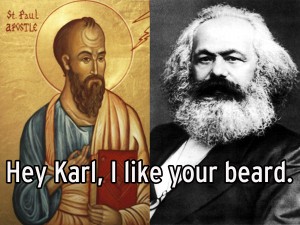Note: This is a post that I originally wrote and put up on my old blog on Saturday, December 2, 2006. Over the next several weeks, in addition to posting new content, I will also be adding previous pieces I have written so as to have ultimately the interesting content from my old site available on this one.
 Recently for a class on Pauline anthropology–how Paul understands the nature of human beings–I had to read a book about the apostle written by an atheist communist French philosopher named Alain Badiou. Given such a description of the author of Saint Paul: Foundations of Universalism (trans. Ray Brassier, Stanford, CA: Stanford University Press, 2003) you might think that it would be a book ready to make the old Marxist case that “Religion is the opiate of the masses.” Oddly enough, it was a book that took next to no interest in religion and instead praised Paul as a model for revolutionary action.
Recently for a class on Pauline anthropology–how Paul understands the nature of human beings–I had to read a book about the apostle written by an atheist communist French philosopher named Alain Badiou. Given such a description of the author of Saint Paul: Foundations of Universalism (trans. Ray Brassier, Stanford, CA: Stanford University Press, 2003) you might think that it would be a book ready to make the old Marxist case that “Religion is the opiate of the masses.” Oddly enough, it was a book that took next to no interest in religion and instead praised Paul as a model for revolutionary action.
Badiou argues that Paul could be considered an “anti-philosopher” of sorts. He says that Paul’s central conviction was not about proclaiming a particular philosophy or rationality, but was rather an event, plain and simple. The event itself was not a system of philosophy and was not contingent upon some abstract system of thought that could be linked with the particularities of culture, ethnicity, education or philosophy (If this sounds crazy read 1 Corinthians, chapters 1, 2, and 15). It was “happenedness” itself. A dead man was raised. Paul’s encounter with the risen Christ–not an encounter with ten steps to a better, moral life–on the road to Damascus changed who he was at his core and propelled him to proclaim this event. Badiou claims that Paul recognized that the resurrection of Christ was not pointing to some philosophy that could be bound to a particular group or particular way of thinking. It was pure event devoid of such particularities and was therefore a universal truth in Paul’s mind. Hence, the “neither Jew nor Greek, slave nor free, male and female” of Galatians 3.28. The event leveled all differences in terms of ultimate significance (of course, differences on a penultimate level are quite wonderful, but do not give one favor in relation to the truth that the event happened and transforms). And Badiou believes that as people encountered Paul’s proclamation of the event, the event would grasp them as well.
“So what?” you ask. Well, the “so what” for Badiou–who thinks the resurrection of Christ is a fable–is that there can be singular moments or events that can completely grasp a person in ways beyond rationality and change the course of their life and actions. For a communist like himself, that event was the communist student riots of 1968. Though the riots were in France and made up of the French, the revolutionary action itself said something universal about love to him (in this case, perhaps a love to counter the intrinsic dominance and control of class and capitalism).
The “so what” for me of Badiou’s reading of Paul is a little different then it is for Badiou. For me, it reminded me that the Paul and his epistles that have been domesticated and made respectable by 1700 years of Christendom are at their core revolutionary. What Paul was saying was “craziness” in his own time of Roman dominance and religious class stratification and is still “craziness” now. For me the resurrection of Christ is a real event that ruptured history and has changed the direction of all reality. The resurrection cannot be explained from some other “rational” starting point; it is itself a foundation of explanation (e.g. If there is a measuring stick that exists as the standard of measurement itself, there is no other measuring stick to use to measure it; it is the starting point). It is an event beyond my education and ability to comprehend it. In fact, it doesn’t require much of anything other than an encounter with the proclamation of the Good News itself and the Spirit of God working through the proclamation to transform and bring you into the very Body of Christ. Funny that it took a French atheist communist to remind me of that.

There are indeed common points between communism and christianity. We gotta consider those and delve into its meaning nowadays when we’re even deeper into conflicts.